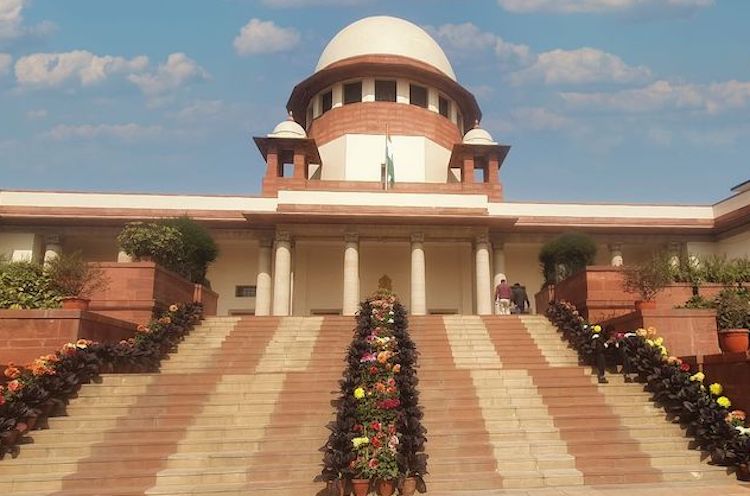
Explainer Briefly Slides The Supreme Court of India on November 19 heard a plea filed by the Indian Federation of App-Based Transport Workers (IFAT), seeking recognition of social security rights for platform workers employed by online food delivery, courier, and taxi aggregator platforms like Ola, Uber, Zomato, and Swiggy. According to the update shared by IFAT’s National General Secretary Shaik Salauddin with MediaNama. The petition, originally filed in December 2021, emphasises the urgency to implement social security measures under the existing labour laws.
Senior Advocate Indira Jaising, representing IFAT, argued that both the Union and State Governments must provide social security provisions for gig and platform workers. She argued that these provisions should include health benefits, insurance, and pension schemes. Overseeing the hearing, Justice Dipankar Datta questioned the Union Government’s delay in submitting its affidavit, despite the case being pending since 2021.
The Union’s counsel requested more time, citing the need for policy decisions. The Court granted the Union a final extension of three weeks to file its reply-affidavit, emphasizing that this would be the last opportunity for compliance. The petition is against the Ministry of Commerce and Industry, Ministry of Labour and Employment, Ministry of Consumer Affairs, Food and Public Distribution, Ministry of Electronics and Information Technology, Ministry of Road Transport and Highways.
Moreover, the petition includes companies like ANI Technologies i.e. ‘Ola’, Uber, Bundl Technologies i.
e. ‘Swiggy’, and Zomato. Senior Advocate Indira Jaising stated that both the Union and State Governments must provide social security provisions for gig and platform workers, as mentioned above.
However, currently, the petition does include States as a party. IFAT vs Union of India, 2021 explained In 2021, IFAT filed a petition before the Supreme Court arguing that the current contracts between companies such as Ola, Uber, Swiggy, Zomato and gig workers consider them as ‘partners’ and not ‘employees’, thereby allowing these companies to avoid providing social security benefits. IFAT had argued that the current agreements between the companies and the workers violate Articles 14, 21 and 23 of the Constitution.
IFAT argued that the agreements between the companies and the workers violated Article 14, which guarantees the right to equality. The petitioners claimed that gig workers faced discrimination by being treated as ‘partners’ rather than ’employees.’ They argued that this treatment led to unequal treatment compared to other workers entitled to social security benefits.
The petitioners argued that excluding gig workers from such protections violated their right to equality before the law. IFAT contended that the failure to provide social security violated the right to life and personal liberty under Article 21. This article not only protects a person’s life but also guarantees the right to livelihood and decent working conditions.
The petitioners argued that by denying gig workers essential benefits like health coverage, insurance, and pensions, the respondents were infringing upon their fundamental right to live with dignity and to work in fair and just conditions. Regarding Article 23, which prohibits forced labor and human trafficking, IFAT argued that the denial of fair working conditions and social security amounted to exploitation. They claimed that gig workers faced exploitation under these agreements, as the companies did not provide the benefits and protections required by law.
This exploitation, according to IFAT, was a form of forced labor, as it placed workers in a vulnerable situation without basic protections. Not considered ‘Workman’ Under Existing Social Security Laws The petition raises important constitutional questions regarding whether the “Right to Social Security” is a fundamental right for all workers, whether employed in formal or informal sectors. The petitioners, known as “gig workers” or “platform workers,” argue that they have an employment relationship with aggregators.
As a result, they state that they should be considered “workman” under various social security laws. These laws include the Workmen’s Compensation Act, 1923, the Industrial Disputes Act, 1947, the Employee’s State Insurance Act, 1948, the Employee’s Provident Funds and Miscellaneous Provisions Act, 1952, the Maternity Benefit Act, 1961, the Payment of Gratuity Act, 1972, and the Unorganised Workers’ Social Welfare Security Act, 2008. Unorganised Workers’ Social Security Act, 2008 The government enacted the Unorganized Workers’ Social Security Act, 2008 (‘UW Act, 2008’) with the sole purpose of providing social security to the unorganised workforce in the country.
The petitioners argued that they should be classified as ‘unorganized workers’ under the UW Act. They state that this classification would entitle them to registration and social security benefits under the law. They claimed that the State’s failure to register them as “unorganized workers” and to provide them with social security under existing laws constitutes a violation of their rights under Article 21 of the Constitution of India.
What are the updates since the 2021 Petition? The Central Government launched the E-Shram portal for creating a National National Database of unorganised workers in 2021. However, the petition states that the portal’s categorization of workers excluded Gig and Platform workers. The petitioner had urged the Central Government to simplify the process to enable App-based workers to register easily.
Central Government relaunched the E-Shram portal, and it currently includes gig workers. Uber also recently announced incentives for their drivers to register on the portal. “Aligned with India’s Code on Social Security, Uber is also supporting driver registrations on the e-Shram portal, a national database for gig and unorganized workers.
To encourage sign-ups, Uber is offering cash incentives to the first 10,000 drivers who register, helping drivers secure future social benefits.” states the press release. Moreover, the petition stated that the President gave assent to the Social Security Code, 2020 , which amends and consolidates laws related to social security with the aim of extending protections to all employees and workers, whether in organised, unorganised, or other sectors.
This Code seeks to replace several existing labor legislations, including the UW Act, 2008. In Chapter IX , under the heading “Social Security for Unorganised Workers, Gig Workers, and Platform Workers,” the Code outlines provisions for creating schemes for unorganized workers. However, the code is still not fully implemented.
Last month, National Human Rights Commission (NHRC) issued a warning to the Centre over delay in required report on the implementation of the Social Security Code, reported The New Indian Express. What do other countries say about Gig Work? In 2020, France’s top court recognized the right of an Uber driver to be classified as an “employee” in its ruling, which upheld the Paris Court of Appeals’ decision from January 10, 2019. As a result, the contract between Uber and its 28,000 drivers in France is now recognized as an “Employment Contract.
”, reported Reuters . Similarly in 2021, the United Kingdom’s Appeals Court pronounced its decision in Uber BV v. Aslam on February 19, 2021.
The court examined the nature of the work performed by Uber drivers and concluded that an Uber driver is a “worker” under a “workers contract.” As a result, Uber drivers are entitled to benefits such as minimum wages, paid holidays and other worker protections, reported BBC . However, Uber in the USA classifies its drivers as “independent contractors” or gig workers, avoiding mandatory employee protections.
In 2020, ride-sharing companies faced disputes over labor protections following California’s AB5 (Assembly Bill 5) law, which aimed to classify gig workers as employees. However, Californian voters later supported Proposition 22, a $200-million campaign led by Uber and Lyft, exempting these companies from employment laws and allowing them to maintain the independent contractor classification. Read More:.














